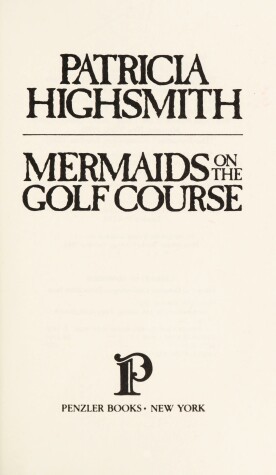Reviewed by brokentune on
Mermaids on the Golf Course is a collection of Highsmith's short stories, and if there was only one word I would choose to describe her stories, that word would be - unsettling.
Highsmith's stories deal with madness and obsession which is bottled up and desperately tries to find an outlet. Whether this is successful and to what extend the characters cope or do not cope with this is what makes Highsmith's stories compelling and terrifying in equal measures.
Ralph realized that it was the Ralstons’ eternal bustling and efficient presence and proximity in the country that was gnawing at him far more than the loss of Jane. The Ralstons had the strange power to make him feel like a worm.
There are eleven short stories in this collection, all of which had me in thoughts about how the characters internalised their anxieties, fears, hates, and other emotions. There is little dialogue between the characters in the stories because there is little interaction by the main characters. The main characters really do draw all of the reader's focus in these stories, but not in a way that allows you to empathise. It's more of a standing by and watching the train wreck unravel, because one of the most compelling aspects of the stories is that they are not predictable.
My favourite, if I had to pick one, in this collection is The Cruelest Month, in which a fanatic reader uses a holiday with a friend to seek out one of her favourite authors. The story is full of cringe-worthy moments. It made me think of Misery, a lot. It also made me think of stalkers and the boundaries between fans and stalkers, and a line from Oasis' Don't Look Back In Anger (not sure why):
Her soul slides away, but don't look back in anger I heard you say
Take me to the place where you go
Where nobody knows if it's night or day
But please don't put your life in the hands
Of a Rock n Roll band
Who'll throw it all away
Of course, another reason I liked this particular story is that Highsmith pays tribute, in her won sardonic way (and which I bet he appreciated), to Graham Greene. Highsmith's central character keeps writing letters to Greene but cannot understand why she does not receive a single reply.
In real life, Highsmith and Greene never met, but they were admirers of each others work. Greene very astutely described her work in his foreword to Highsmiths short story collection Eleven when he summarised that:
Miss Highsmith is the poet of apprehension rather than fear. Fear after a time, as we all learned in the Blitz, is narcotic, it can lull one by fatigue into sleep, but apprehension nags at the nerves gently and inescapably. We have to learn to live with it.
As you may know, I am a bit of a Greene fan, so the reference in the story jumped out at me, but I was also considering that there are a few similarities between Greene and Highsmith with respect to the fictional "worlds" they created. Whereas, Greene-land as I like to call it, was dark, bleak but also filled with humanity (even if it seemed to be a failing humanity), Highsmith's realms are often, tho atmospheric, of a nature that is less tangible because it deals with thought processes and emotions that are, not harder to follow, but that are a little more fragile.
She walked back towards the town of Little Starr in a daze of shame and confusion. He had detested her! And she had nourished a fantasy of being invited in for a cup of tea, invited to take a look at the desk where he worked! Odile felt that she had just made the worst social gaffe of her life. She had intruded, like a piece of riffraff off the street!
Reading updates
- Started reading
- 11 September, 2016: Finished reading
- 11 September, 2016: Reviewed
